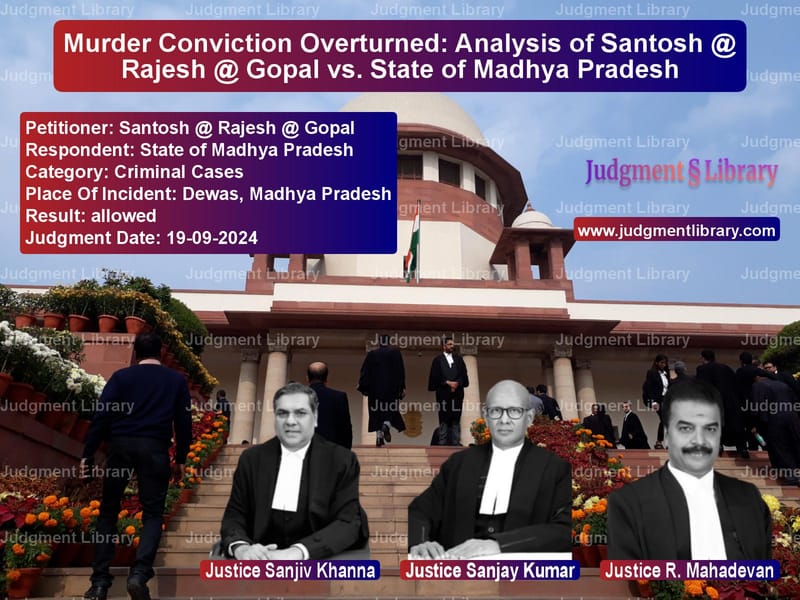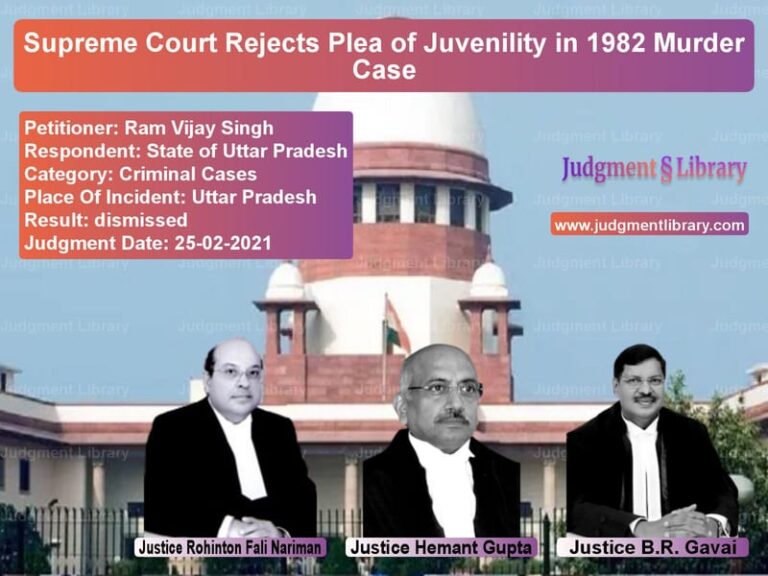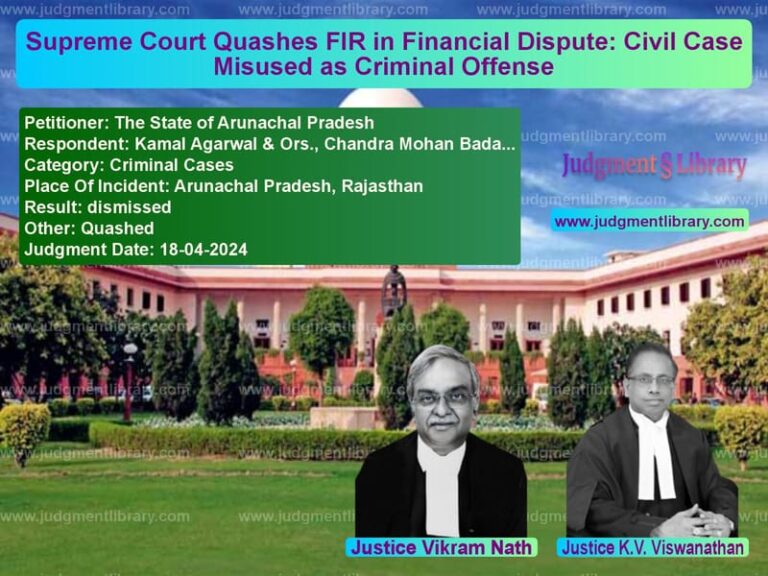Murder Conviction Overturned: Analysis of Santosh @ Rajesh @ Gopal vs. State of Madhya Pradesh
The Supreme Court of India recently set aside the conviction of Santosh @ Rajesh @ Gopal in a long-running criminal case related to the murder of Narayan Singh in 2011. This case, which involved allegations of conspiracy and hired assassins, underscores the importance of stringent evidentiary requirements in cases based on circumstantial evidence.
Background of the Case
On November 13, 2011, Narayan Singh was shot dead outside his home in Village Binjana, District Dewas, Madhya Pradesh. His mother, Rachna Bai (PW-2), was the key prosecution witness, stating that she heard two gunshots and saw two masked individuals fleeing on a motorcycle. She also saw Narayan Singh’s wife, Laadkunwar Bai, and his son, Jitendra Singh, standing nearby.
Five individuals were accused in this case:
- Laadkunwar Bai (wife of the victim)
- Jitendra Singh (son of the victim)
- Meharban Singh (father-in-law of Jitendra Singh)
- Nirbhay Singh @ Rajesh Mama (alleged hired killer)
- Santosh @ Rajesh @ Gopal (alleged hired killer)
The prosecution alleged that the murder was planned by Narayan Singh’s wife and son, who hired contract killers to execute the crime.
Trial Court Conviction
On November 30, 2017, the trial court acquitted Laadkunwar Bai and Meharban Singh but convicted:
- Nirbhay Singh @ Rajesh Mama
- Jitendra Singh
- Santosh @ Rajesh @ Gopal
High Court Appeal
All three convicted individuals appealed to the Madhya Pradesh High Court. During the pendency of the appeal, Nirbhay Singh @ Rajesh Mama passed away, and his appeal was dismissed as abated. On October 18, 2022, the High Court acquitted Jitendra Singh but upheld the conviction of Santosh @ Rajesh @ Gopal, leading to his appeal before the Supreme Court.
Supreme Court’s Review
The case against the appellant, Santosh @ Rajesh @ Gopal, rested entirely on circumstantial evidence. The prosecution’s key evidence included:
- The ballistic report (Exhibit P-57), which matched the bullet recovered from Narayan Singh’s body with a country-made pistol (Exhibit A-1 & C-1).
- The alleged recovery of this pistol (Exhibit P-6) from the appellant.
However, as the Court noted, there were no eyewitnesses directly implicating the appellant in the crime. The Supreme Court reiterated the principle that a conviction based purely on circumstantial evidence must satisfy stringent criteria:
The Five Essential Principles for Conviction Based on Circumstantial Evidence
Referring to Sharad Birdhichand Sharda v. State of Maharashtra, the Supreme Court reaffirmed the five “golden rules” required for a conviction based on circumstantial evidence:
- The circumstances from which the conclusion of guilt is to be drawn should be fully established.
- The facts so established should be consistent only with the hypothesis of guilt, not explainable by any other hypothesis.
- The circumstances should be conclusive in nature.
- They should exclude every possible hypothesis except the one to be proved.
- There must be a complete chain of evidence leaving no reasonable doubt about the accused’s guilt.
Issues in the Prosecution’s Case
The Supreme Court found significant gaps in the prosecution’s case:
- The alleged pistol recovery (Exhibit P-6) was based on a disclosure statement (Exhibit P-35) given by co-accused Nirbhay Singh, who was already deceased. The Court noted that Section 27 of the Indian Evidence Act requires that only facts distinctly leading to discovery can be admissible, not generalized confessions.
- The prosecution failed to establish a direct link between the appellant and the actual act of murder. While the ballistic report matched the bullet with the pistol, it did not prove that the appellant fired the gun.
- There was no corroborative evidence placing the appellant at the crime scene beyond reasonable doubt.
The Supreme Court cited its judgment in State of Maharashtra v. Suresh, which outlined three possible scenarios when an accused points out the location of a weapon:
- He himself concealed it.
- He saw someone else conceal it.
- He was informed by another person about its location.
Since the prosecution’s case rested solely on circumstantial evidence, the Court found that it failed to eliminate other possible scenarios and prove the appellant’s direct involvement in the crime.
Supreme Court’s Verdict
The Supreme Court allowed the appeal and set aside the conviction of Santosh @ Rajesh @ Gopal. The Court concluded that:
- The prosecution did not establish a complete chain of evidence proving the appellant’s guilt beyond reasonable doubt.
- The circumstantial evidence presented was not conclusive.
- The ballistic evidence alone was insufficient to convict the appellant without corroborating testimony placing him at the scene.
- The appellant’s bail bonds and sureties were canceled, and he was fully acquitted of the charges.
Key Takeaways from the Judgment
- This case underscores the stringent evidentiary requirements in cases relying solely on circumstantial evidence.
- The importance of corroborative evidence in linking an accused directly to the crime was reaffirmed.
- The ruling highlights the role of procedural safeguards in preventing wrongful convictions.
- The judgment serves as an important precedent for future cases where evidence is primarily circumstantial.
The Supreme Court’s decision in Santosh @ Rajesh @ Gopal vs. State of Madhya Pradesh serves as a reminder that courts must exercise utmost caution when dealing with cases where the prosecution’s evidence is purely circumstantial. The principles of justice demand that no individual be convicted unless their guilt is proven beyond reasonable doubt.
Petitioner Name: Santosh @ Rajesh @ Gopal.Respondent Name: State of Madhya Pradesh.Judgment By: Justice Sanjiv Khanna, Justice Sanjay Kumar, Justice R. Mahadevan.Place Of Incident: Dewas, Madhya Pradesh.Judgment Date: 19-09-2024.
Don’t miss out on the full details! Download the complete judgment in PDF format below and gain valuable insights instantly!
Download Judgment: santosh-@-rajesh-@-g-vs-state-of-madhya-prad-supreme-court-of-india-judgment-dated-19-09-2024.pdf
Directly Download Judgment: Directly download this Judgment
See all petitions in Murder Cases
See all petitions in Bail and Anticipatory Bail
See all petitions in Attempt to Murder Cases
See all petitions in Judgment by Sanjiv Khanna
See all petitions in Judgment by Sanjay Kumar
See all petitions in Judgment by R. Mahadevan
See all petitions in allowed
See all petitions in supreme court of India judgments September 2024
See all petitions in 2024 judgments
See all posts in Criminal Cases Category
See all allowed petitions in Criminal Cases Category
See all Dismissed petitions in Criminal Cases Category
See all partially allowed petitions in Criminal Cases Category







